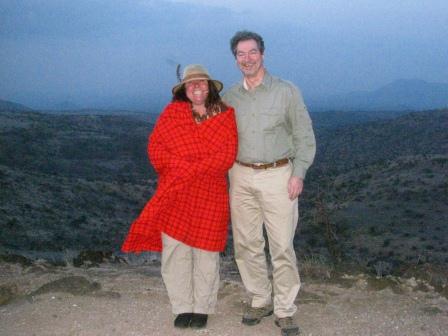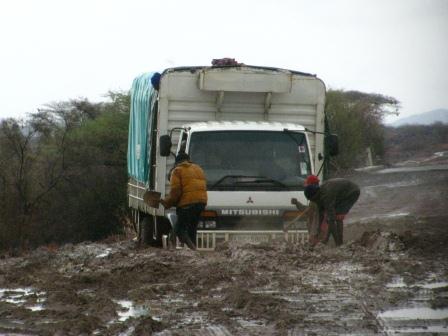
A cold wind and rain blows in from the north. Little did we know what was in store for us after our last night at Sirikoi.
The clouds had been gathering for days before our final night at Sirikoi Camp. During the early hours, cracks of thunder could be heard in the distance. Lightening lit up the roof of our tent. At dawn we heard a pride of nearby lions who growled and whoofed their displeasure. When our coffee arrived at 6 am it was still dark and by the time we walked to breakfast at the main house, a light rain was falling. We said our goodbyes and packed our bags in an enclosed vehicle for the drive to the main gate where Kura was waiting with the Gumpsmobile. It was a long slow drive in the mud.
We were heading north again, and Kura was waiting when we arrived. This trip was for Doug – we all wanted him to see BOMA’s work and meet some of the business groups. Omar and Semeji jumped out of the vehicle when we arrived – big smiles in the rain. Sarah Ellis, BOMA’s Fellow, was also along. Sarah and I had not yet had a chance to meet to discuss the micro-savings research and surveys that she had conducted. We needed time to review and discuss the implementation of the pilot and ongoing program that will help our business people build safe, secure savings.
It rarely rains in February, especially in northern Kenya, and we were all amazed at this sudden change, especially after the searing heat and drought of the past few months. As we drove north, the evidence of huge downpours during the night were everywhere. Kura looked at me with a knowing glance. “Mama Rungu, if this rain has come to Laisamis we are in trouble.
”The road to Ngurunit, where we would spend our first night, was the worst in the district. Add rain and you have a track of cement-like soup. “We will see, Mama Rungu, but we might have to break out one of your Plan B’s.”
At the final bridge crossing before we turned off the main road we stopped and looked down at the Malgez River. “Mama Rungu,” Kura yelled, “this river has not flowed since 1997!” His eyes were wide with amazement. Semeji pulled out his cell phone and animatedly started calling his fellow warriors, one of many phone calls he would make whenever we had cell service. The topic: what this will mean for the grazing of the distressed cattle who have suffered over the past few months…where has there been rain…..where can the cattle cross the rivers….where will everyone move their cattle…..will this mean more conflict with the livestock on the move? Semeji was distracted.
We turned off the main road and headed towards Ndikir. Kura managed to keep the vehicle moving in the right combination of speed and gear but the driving was getting tougher and tougher. Suddenly the vehicle started sidewiding as it worked to gain a grip. With a thunk we sank into a patch of deep clay and mud. We were stuck. It took over an hour of rocking but it was the arrival of the GSU military officers who finally pushed us out. They were on their way to rescue Honorable Lekuton, the local MP, who had left the night before to prepare his private camp for our arrival. “He’s been stuck out there all night,” we were told, and no one can reach him. GSU officers had also tried reaching Lekuton from the north but there were also now stuck.
We were all soaked and caked in mud as we backtracked to the main road. “Plan B, Mama Rungu!” Kura said.
“Ok, Kura, let’s try and make it to Loglogo where we can spend the night.” When we reached the checkpoint at Laisamis village the town was practically deserted. Only two people were in the small huts of the five businesses we have in town. Not much for Doug to see.
The main road was worse for its large potholes and gullies. It must have rained all night, hard, to create these conditions. Just south of Loglogo we came upon a lorry above its axles in a hole as big as a swimming pool. Kura, of course, knew the driver, another one of his cousins. We drove past the lorry and parked to watch the vehicle works its way out of the mud. Two men shoveled a path and then the huge vehicle crawled its way up, up and then at the last minute, with just a few feet to go, it slid back down into the gaping hole. “Don’t worry, he will get out,” Kura assured us and a few hours later, we heard he had made it to town.
We arrived, once again, to an abandoned Isgargaro camp. Kura called for Aleya, who rustled up some of the other women. Every mattress in every hut was soaked. In a gesture of incredible generosity, Aleya rounded up people willing to donate metal beds and foam mattresses so that we would have a dry place to sleep. A fire was lit for tea and we all sat shivering under a tree in the rain and gloom, a far cry from just 5 days ago, when we had sat in the shade of the same tree to escape the 100 + degree weather that had now changed course.

